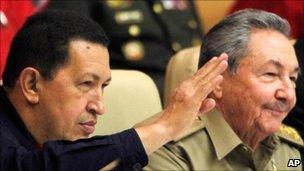Castro calls rare Cuba communist party congress
- Published

Raul Castro announced the party conference during a meeting with his Venezuelan ally Hugo Chavez
Cuban President Raul Castro has called the first congress of the ruling Communist Party in 14 years.
He said the congress, to be held in April next year, would address Cuba's economic problems.
The party congress is supposed to be held every five years but has been repeatedly postponed.
Since taking over from his brother Fidel in 2006, Raul Castro has taken steps to reduce the state's almost total control of the economy.
"The sixth Congress will concentrate on solving problems in the economy, on the fundamental decisions on updating the Cuban economic model, and will outline the economic and social policy of the party and the revolution," President Castro said.
He urged all Cubans to help prepare for the meeting, saying that unity between "revolutionaries, the leadership and the majority of the people" was vital to the "future perfection of socialism".
Raul Castro has taken steps to promote small private enterprise.
In September, he announced plans to lay off around a million state employees - around a fifth of the workforce - and encourage them to find work in the private sector.
Half of those posts are to go by the end of March, just weeks before the planned congress.
Mr Castro also said restrictions on private enterprise would be eased, with small businesses allowed to employ staff, borrow money, and sell services to government departments.
Cuba's state-run economy has been gripped by a severe crisis in the past two years that has forced it to cut imports.
It has suffered from a fall in the price for its main export, nickel, as well as a decline in tourism. Growth has also been hampered by the 48-year US trade embargo.
President Castro made the announcement during a meeting in Havana with his ally, Venezuelan President Hugo Chavez.
They extended a 10-year-old co-operation agreement between the two countries. President Castro said there would be a "strategic union".
Venezuela is Cuba's biggest trading partner and supplies it with oil at preferential prices in exchange for the work of thousands of Cuban health workers and other specialists in Venezuela.
- Published14 September 2010
- Published2 August 2010